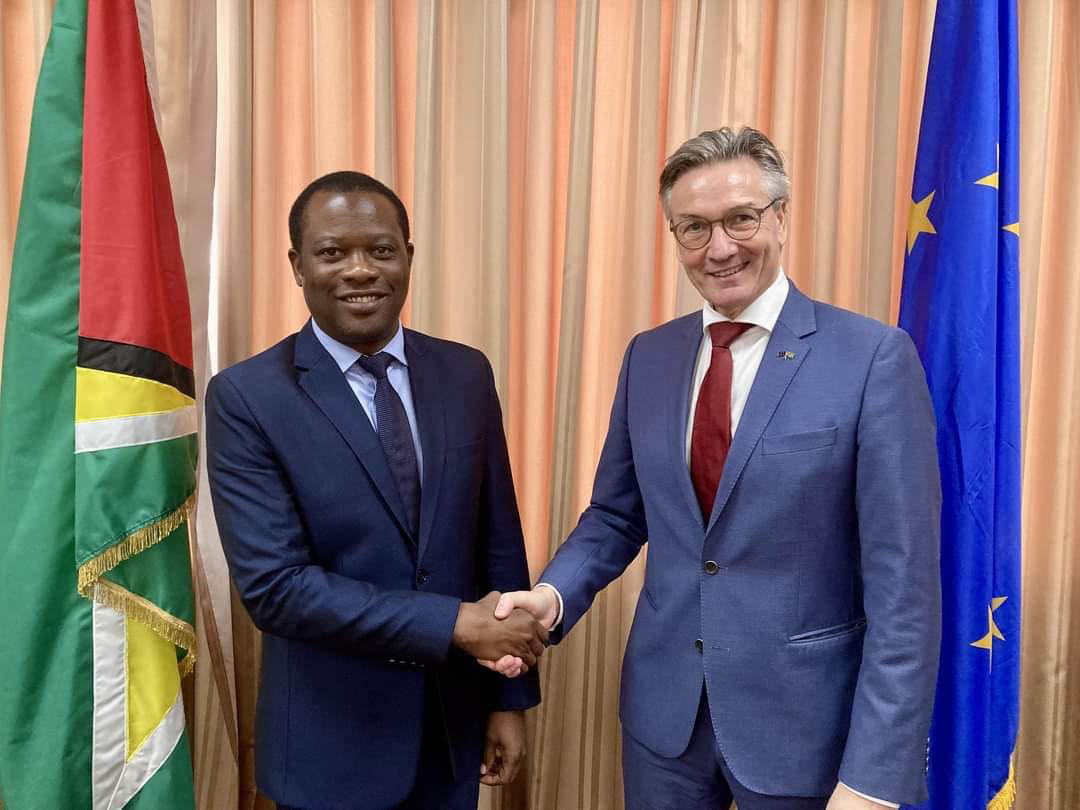Guyana is yet to sign on to the Samoa Agreement – the successor to the Cotonou Agreement that the Organisation of African, Caribbean and Pacific Group of States (OACPS) has with the European Union (EU) – as it is addressing concerns including the matter of refugees, sources say.
However, EU Ambassador here, René van Nes on Thursday expressed optimism that this country’s signature will be added as it seeks answers to concerns before ratification.
“At this moment, 64 countries have signed. Until now Guyana has not yet done that but we have very positive indications that Guyana will favourably sign,” van Nes said at a press conference when asked for an update by Stabroek News.
“They had some concerns, and it is good that they take their time and look at that and they sign things only when they are comfortable. So we are talking about those issues that they would like clarified. And I am quite positive that that indeed will lead into a signature of Guyana,” he added.
At a time when Guyana needs the support of many global partners to rally behind it, in the face of heightened Venezuelan aggression and the border controversy matter which is before the International Court of Justice, this country says that it wants especially, the issue of the treatment of migrants cleared before joining the 79-member-country agreement.
Sources close to the process told this newspaper that this country is currently having discussions about the agreement before it decides on signing on as it has concerns on non-trade provisions that talk of refugees, among other minor matters, and this country says it found them unacceptable.
One source said that this country has been trying to get an “interpretative statement to show Guyana’s position” before signing. It is unclear if these matters were raised in the several years of negotiations.
In the meantime, Guyana believes that there might be an opinion to suggest that the provision has no harm, since the Agreement would be implemented within each country’s legal framework.
Guyana, another source said, is not signatory to the United Nations Convention Relating to the Status of Refugees and it believes that a part of the Samoa Agreement has clauses which reference this.
“We are not signatory to the UN convention on refugees. It has all sorts of obligations. Clause 76 speaks to the treatment of migrants… and that has been an argument,” one source said.
A statement from the European Union mission here on Thursday highlighted that the EU and Guyana held discussions on Tuesday and the Samoa Agreement was discussed but the statement did not go into detail.
“Aligned with the Dialogue’s objective of exchanging information and fostering mutual understanding, both sides engaged in open and constructive discussions on areas of common interest at bilateral, regional and international level, including on new challenges in international settings. They reaffirmed their commitment to the continuation and further enhancement of collaboration between Guyana and the European Union,” it added.
The joint statement said that, “Both sides acknowledged the transition from the Cotonou Partnership Agreement, which ended on 31 December 2023, and discussed Guyana’s accession to its successor – the Samoa Agreement.”
Further, it pointed out that “Minister Hugh Todd underscored the importance of the relationship between the European Union and Guyana and reiterated Guyana’s unwavering commitment to enhancing collaboration in the areas of climate change, energy, security, people-to-people ties, and trade. He also noted the European Union’s pivotal role as a key developmental partner for Guyana.”
On November 15, 2023, the EU and its member states signed the new partnership agreement in Samoa.
“The multiple negotiation levels, the coronavirus crisis, and difficulties in reaching agreement on sensitive issues, such as migration management and sexual and reproductive health and rights, prevented the new agreement from being finalised by the initial expiry date set in the Cotonou Agreement,” the EU Parliament said on its website.
“… The Samoa Agreement is based on six key priorities: human rights, democracy and governance; peace and security; human and social development; inclusive, sustainable economic growth and development; environmental sustainability and climate change; and migration and mobility. The EU and the OACPS agreed on the principle of a common foundation complemented by three regional protocols for African, Caribbean, and Pacific OACPS members respectively,” it adds.
“It took more than two years of negotiations before the text of a renewed partnership agreement was in April 2021, and two more years for the EU Member States to resolve dissenting views before signing,” the EU stated.
“The future agreement will be provisionally applied from January 2024, and further legal procedures will be required before it can enter fully into force, notably ratification by at least two-thirds (53) of OACPS members,” it added.










